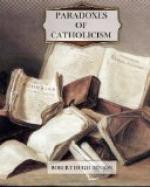(iii) Turn, then, once more to the Catholic Church and see how in the Life which she offers, as in none other, there is presented to us a means of fulfilling our end.
For it is she alone who even demands in the spiritual sphere a complete and entire abnegation of self. From every other Christian body comes the cry, Save your soul, assert your individuality, follow your conscience, form your opinions; while she, and she alone, demands from her children the sacrifice of their intellect, the submitting of their judgment, the informing of their conscience by hers, and the obedience of their will to her lightest command. For she, and she alone, is conscious of possessing that Divinity, in complete submission to which lies the salvation of Humanity. For she, as the coherent and organic mystical Body of Christ, calls upon those who look to her to become, not merely her children, but her very members; not to obey her as soldiers obey a leader or citizens a Government, but as the hands and eyes and feet obey a brain. Once, therefore, I understand this, I understand too how it is that by being lost in her I save myself; that I lose only that which hinders my activity, not that which fosters it. For when is my hand most itself? When separated from the body, by paralysis or amputation? Or when, in vital union with the brain, with every fibre alert and every nerve alive, it obeys in every gesture and receives in every sensation a life infinitely vaster and higher than any which it might, temporarily, enjoy in independence? It is true that its capacity for pain is the greater when it is so united, and that it would cease to suffer if once its separation were accomplished; yet, simultaneously, it would lose all that for which God made it and, saving itself, would be lost indeed.




